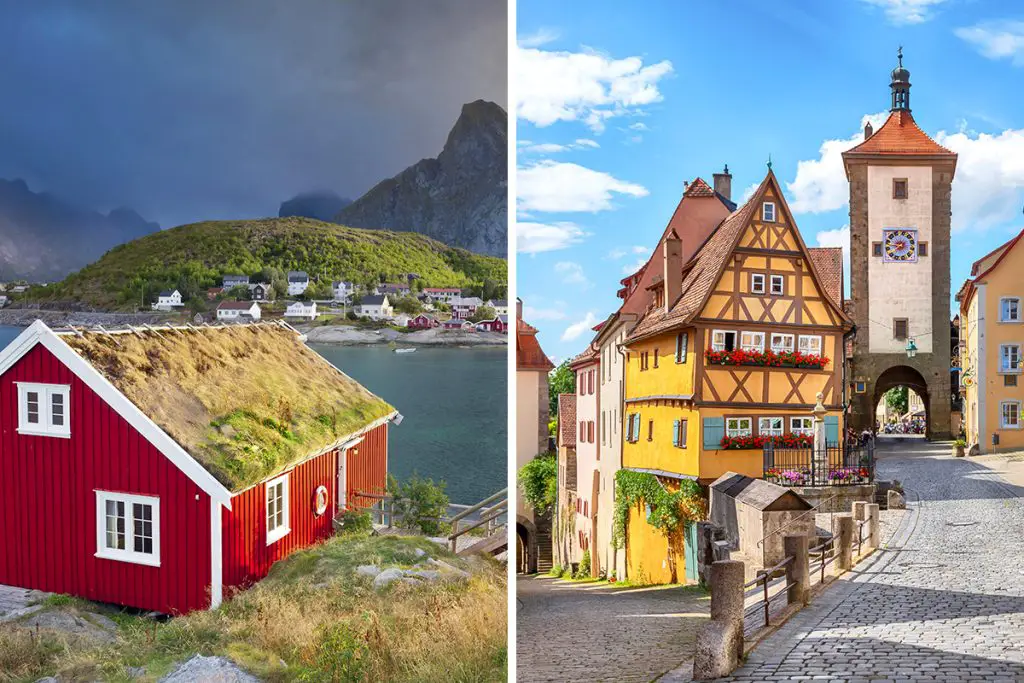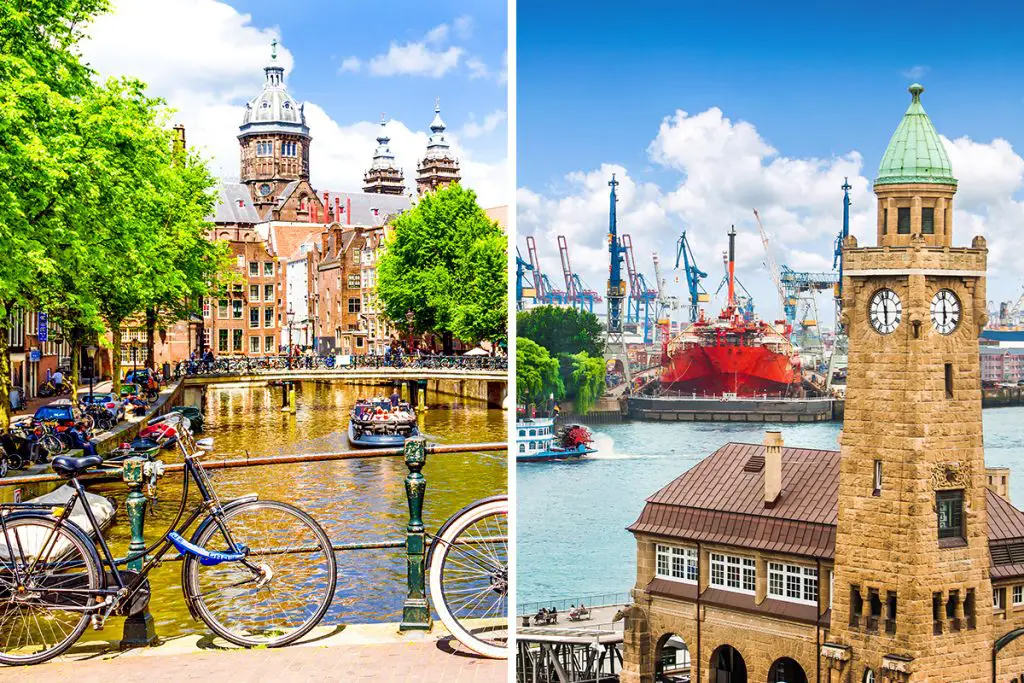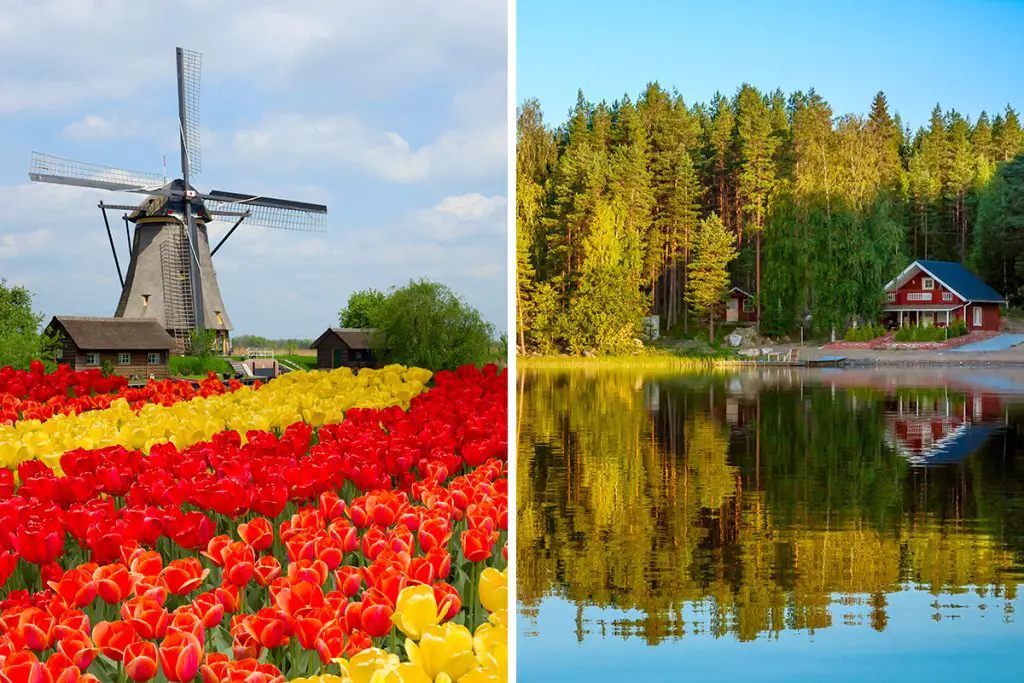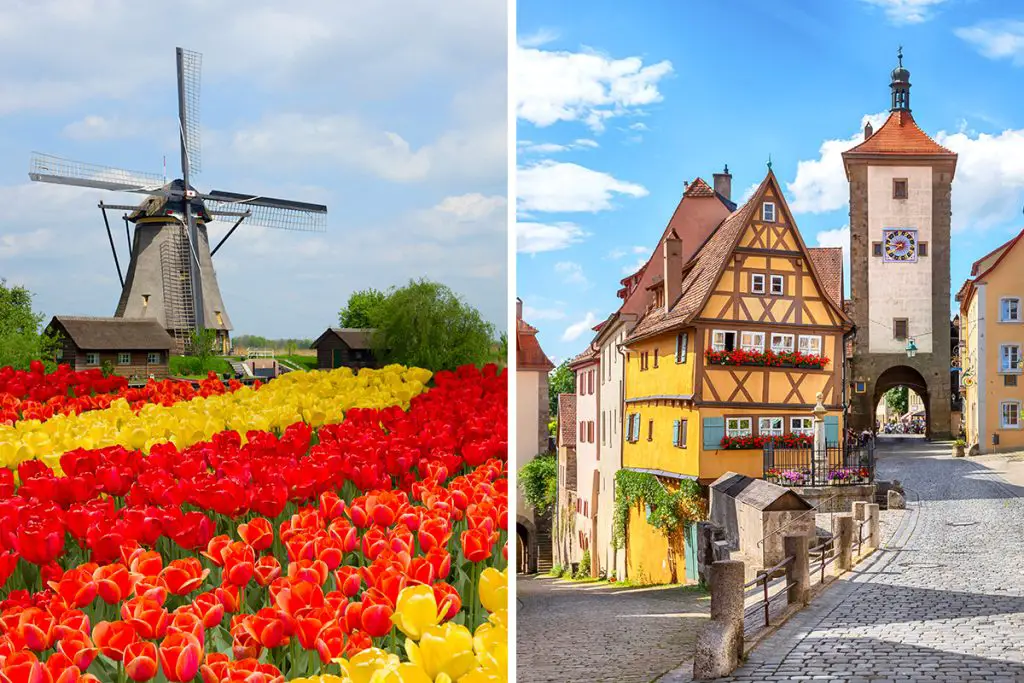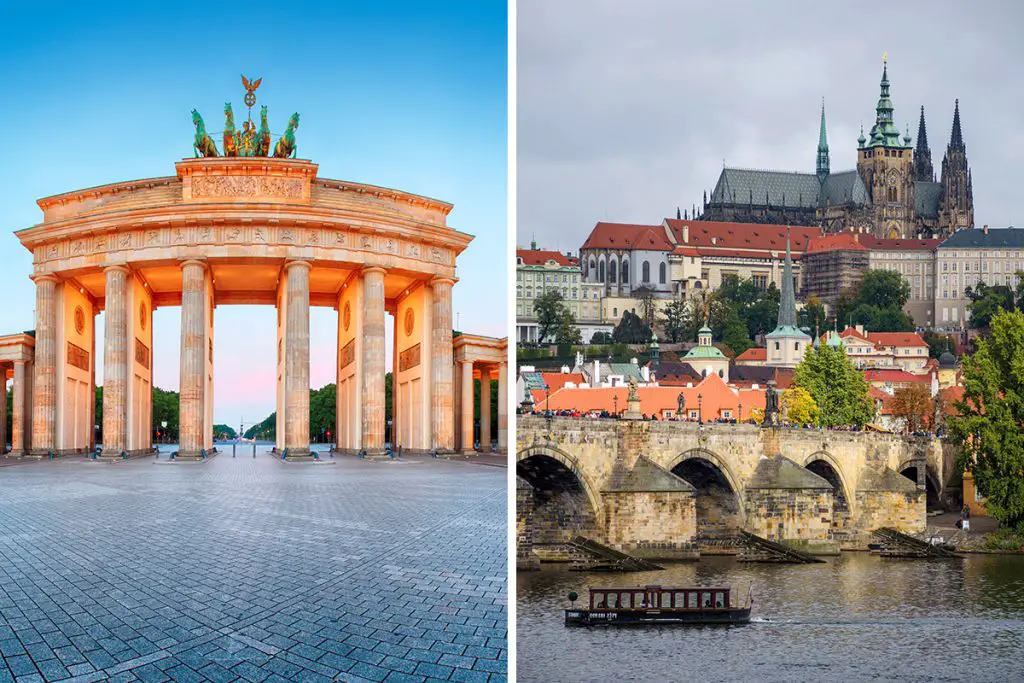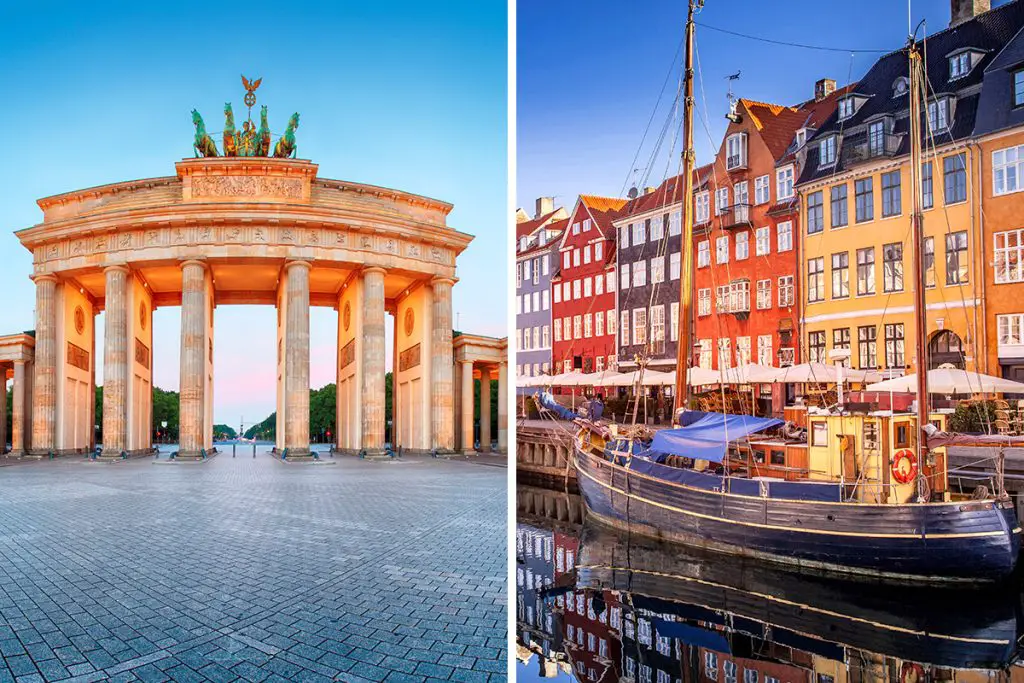Diving into the mysteries and beauty of both destinations can lead you on an unforgettable journey. As you traverse through Hamburg’s historic port city or immerse yourself in the dynamic culture of Berlin, you’ll surely uncover a plethora of experiences waiting to be explored. Are you ready to delve deeper into what makes each city special?
History & Culture
Before comparing Hamburg and Berlin, it’s crucial to get a grasp on the significance of their histories and cultures. After all, it’s the past that forms the foundation of a city’s present.
Hamburg’s history is deeply rooted in its maritime background. As an ancient port city, its past is filled with tales of sailors, trade, and exploration.
Today, this history manifests in its architecture, museums, and people, creating a unique blend of old-world charm and modern sophistication. Despite being a bustling metropolis, Hamburg still retains the feel of a quaint old-world port town, filled with historical buildings and stories waiting to be discovered.
On the other hand, Berlin has always been at the forefront of change. From its time as the capital of Prussia to its days as a divided city during the Cold War, Berlin has a layered history that is difficult to ignore.
It’s a city that has continually reinvented itself while still holding onto its past. This transformative nature is reflected in the diverse culture, which merges various art forms, history, and a rich tradition of intellectual thought.
In comparing the two, it becomes evident that both cities offer distinct historical experiences. Hamburg might be perfect if you’re yearning for a maritime historical adventure steeped in trade and exploration. Conversely, if a melting pot of history, art, and transformation excites you, then Berlin may be your ideal destination.
Summing up, the history and culture of Hamburg and Berlin are a testament to their distinct pasts. These histories have shaped the cities and their culture, giving each a unique identity. Your choice between Hamburg and Berlin will undoubtedly hinge on your personal preference for maritime history or a diverse and transforming historical narrative. Where does your curiosity lead you?
Attractions & Activities
Every city unfolds its story through its attractions and activities. In Hamburg and Berlin, you’ll find that each offers a range of things to see and do that reflect their distinct characters.
Starting with Hamburg, the city’s maritime history is highlighted by its stunning port, which is a must-visit. The Port of Hamburg, one of the largest in Europe, is bustling with life and activity. A tour of the harbor offers views of the grand ships, tugboats, and cargo vessels that are a testament to the city’s maritime past.
For lovers of architecture, Hamburg’s historic Speicherstadt is a delight. This world’s largest warehouse district, built on timber-pile foundations, is a UNESCO World Heritage site and a sight to behold with its unique red-brick architecture. A walk around the area allows you to absorb the atmosphere of this unique place.
Shifting our focus to Berlin, the city’s layered history unfolds in many of its attractions. The Berlin Wall, or what remains of it, stands as a stark reminder of the city’s divided past. A stroll along the East Side Gallery, the longest surviving section of the wall, offers a glimpse into the city’s history through vibrant and poignant graffiti art.
For a more laid-back activity in Berlin, you could visit the numerous parks and gardens that adorn the city. Tiergarten, for instance, is a sprawling park right in the heart of the city. It’s an ideal spot for a leisurely stroll, a bike ride, or simply to relax and enjoy the greenery.
To summarize, Hamburg and Berlin both offer unique attractions and activities that are bound to make your visit memorable. Whether it’s the maritime charm of Hamburg or the historical richness of Berlin, your choice of destination will come down to what kind of adventure you’re seeking.
Beaches
When it comes to beaches, both Hamburg and Berlin have their unique offerings. Despite their differences, these cities present opportunities for some seaside fun.
Hamburg, with its proximity to the North Sea, boasts several beach locales. The Elbstrand is a notable favorite among locals and tourists alike. Located about 8 miles (approximately 13 kilometers) from the city center, this beach offers panoramic views of passing ships and the picturesque Blankenese district.
On the other side, Berlin is landlocked and doesn’t have a natural beach. However, it does offer some unique alternatives. One such place is the Badeschiff, a floating public swimming pool in the River Spree. It’s located about 4 miles (about 6.4 kilometers) from the city center and offers a unique beach-like experience.
While you can’t build sandcastles there, it offers a fantastic view of the city skyline and a laid-back vibe. In the summer, the area around the Badeschiff transforms into a beach bar with sand, hammocks, and beach chairs, offering a fun beach atmosphere right in the heart of the city.
In a nutshell, whether you want to enjoy the maritime feel of the Elbstrand in Hamburg or prefer the innovative urban beach experience of the Badeschiff in Berlin, both cities ensure that beach lovers aren’t left disappointed. It just comes down to what kind of beach experience you prefer: a traditional one by the sea or a quirky urban one. What’s your beach style?
Eating, Drinking & Nightlife
The experiences of eating, drinking, and experiencing nightlife can often shape one’s impression of a city. Both Hamburg and Berlin offer these experiences in their unique styles.
When it comes to food, Hamburg boasts a rich and varied culinary scene. The city is especially renowned for its seafood, owing to its maritime heritage. The famous Fischmarkt, a traditional fish market, is a must-visit for seafood lovers.
In contrast, Berlin offers a diverse mix of food options. Known for its multicultural cuisine, you can sample food from around the world in this city. Of course, don’t forget to try the iconic Currywurst, a fast-food dish that’s quintessentially Berlin.
As for drinks, Hamburg takes pride in its beer culture. A visit to the traditional breweries around the city provides a unique insight into Hamburg’s beer-making history. Sipping a locally brewed beer in a cozy pub is an experience not to be missed.
Berlin, known for its clubbing scene, is also home to numerous unique and diverse bars. If you fancy a cocktail or two, this city won’t disappoint. You’ll find everything from chic rooftop bars to quirky and unique spots, each offering a different ambiance and drink selection.
Speaking of nightlife, Berlin’s reputation precedes it. Known as one of the world’s best cities for clubbing, its nightlife is energetic and vibrant, with clubs and music venues catering to all tastes.
In Hamburg, nightlife has a different charm. Reeperbahn, the city’s most famous entertainment district, offers a mix of music venues, theatres, and bars. It’s a bustling area where there’s always something happening.
In conclusion, whether it’s the seafood delights of Hamburg or the diverse food scene of Berlin, the traditional beer culture of Hamburg or Berlin’s cocktail bars, or the bustling nightlife of both cities, your preferences will guide your choice.
Shopping
The shopping experiences in Hamburg and Berlin are as unique as the cities themselves.
Hamburg presents a mix of high-end fashion boutiques and quirky local shops. Neuer Wall is one of the city’s most exclusive shopping streets, where you’ll find luxury brands and designer boutiques. If you’re looking for something unique, the Karolinenviertel district is known for its independent shops selling locally made goods.
Berlin, on the other hand, is known for its eclectic mix of shopping options. The city offers everything from vintage shops to contemporary fashion stores. Mitte district is filled with trendy boutiques and design shops, while Kreuzberg is known for its secondhand and vintage shops.
In terms of department stores, both cities have their champions. Hamburg’s Alsterhaus offers a refined shopping experience with its wide selection of international brands. In Berlin, the Kaufhaus des Westens, also known as KaDeWe, is Europe’s second-largest department store, boasting a vast array of products.
So whether you’re hunting for the latest fashion, a unique souvenir, or a luxury item, both Hamburg and Berlin cater to your shopping desires. Your choice of city might just come down to whether you prefer Hamburg’s blend of high-end fashion and local goods or Berlin’s eclectic mix of trendy boutiques and vintage shops.
Accommodation
Finding the right place to stay is crucial in shaping your travel experience. Whether it’s Hamburg or Berlin, each city offers its unique take on hospitality.
In Hamburg, you’ll find a mix of grand, traditional hotels and modern boutique accommodations. The city is known for its luxurious stays, such as the Fairmont Hotel Vier Jahreszeiten, which is located on the Inner Alster Lake. On the other end of the spectrum, Superbude St. Pauli offers a trendy, relaxed environment for the modern traveler.
Berlin, on the other hand, is a city of contrasts and its accommodations reflect this. You have classic, luxurious hotels like the Adlon Kempinski, which is steeped in history. Alternatively, Berlin also offers an array of unique, art-inspired hotels like the Michelberger Hotel in Friedrichshain, known for its eclectic design.
In summary, whether you fancy the luxurious and traditional or the modern and quirky, both Hamburg and Berlin cater to diverse accommodation preferences. Your perfect stay could be in a grand hotel by a lake in Hamburg or perhaps in an art-filled modern space in Berlin.
Family-Friendliness & Children’s Activities
Traveling with family requires careful consideration of a city’s family-friendliness and available children’s activities. Both Hamburg and Berlin have plenty to offer.
Hamburg is known for its wealth of family-friendly attractions. Miniatur Wunderland, the world’s largest model railway exhibit, is a major hit with children. Hagenbeck Zoo, home to over 1,850 animals, is another family favorite in Hamburg.
Berlin, with its rich history and culture, also boasts numerous family-friendly attractions. The Museum of Natural History, featuring massive dinosaur skeletons, is popular among children. Another highlight is the Berlin Zoo, one of the most visited zoos in Europe, which hosts a wide range of animals.
In conclusion, whether it’s exploring miniature worlds in Hamburg or stepping back in time with dinosaurs in Berlin, both cities offer memorable experiences for families. Where would your little ones have the most fun?
Getting There & Getting Around
Planning your travel to and around a city is a significant part of any trip. Let’s look at how Hamburg and Berlin fare in this respect.
Getting to Hamburg usually involves flying into Hamburg Airport, located around 6 miles (approximately 10 kilometers) from the city center. On the other hand, Berlin is served by Berlin Brandenburg Airport, which is about 13 miles (roughly 21 kilometers) from central Berlin. Both airports are well-connected to their city centers through public transportation.
Navigating around Hamburg is relatively easy with its efficient public transport system, including buses, ferries, and the U-Bahn (underground railway). Similarly, Berlin boasts an extensive public transportation network comprising the U-Bahn, S-Bahn (overground railway), buses, and trams.
Summarizing, both Hamburg and Berlin are well-connected cities with efficient public transportation systems. Whether you choose to explore the port city of Hamburg or the historic city of Berlin, getting there and getting around will be a breeze.
Weather
Weather is an important factor when planning a trip. It’s worthwhile understanding what kind of climate you can expect in both Hamburg and Berlin.
Hamburg, located near the North Sea, experiences a maritime climate. Winters can be chilly with temperatures dipping as low as 32°F (0°C) in the coldest months of January and February. Summers are mild and comfortable, typically reaching highs of 72°F (22°C) in July and August.
Berlin, slightly more inland, has a temperate seasonal climate. Winters can be colder than Hamburg with temperatures often dropping below 32°F (0°C). However, the summer months of June to August can be warmer with highs often reaching 77°F (25°C).
In summary, whether you prefer the maritime climate of Hamburg with milder summers and winters or Berlin’s temperate seasonal climate with potentially warmer summers and colder winters, knowing what to expect will help you pack the right clothes for your trip.
Safety
Safety is often a primary concern for travelers. Both Hamburg and Berlin are considered safe cities, but like any major city, they have their nuances.
Hamburg is generally a safe city with low crime rates. The city is particularly proud of its well-lit streets and efficient policing. Just remember to exercise the usual caution, particularly around crowded areas and tourist spots.
Berlin, too, enjoys a reputation as a safe city, but it has its areas where you might need to be more vigilant, especially at night. As always, it’s advised to stay aware of your surroundings and avoid less busy areas late at night.
Non-crime-related safety includes traffic rules. Both cities have well-regulated traffic systems, and it’s important for pedestrians to follow the traffic signals.
In conclusion, whether you are exploring the vibrant streets of Hamburg or delving into the history of Berlin, safety should always be a priority. Always remember, no matter where you are, common sense is your best safety tool.
Cost
Understanding the cost of traveling to a city is an important aspect of planning. Let’s explore the cost differences between Hamburg and Berlin.
Hamburg, known for its opulence, can be a slightly more expensive city compared to Berlin. Dining at a mid-range restaurant could cost around €60 (around $70) for two people. Hotel prices can vary, but on average, a double room in a mid-range hotel could cost around €100 (approximately $115) per night.
Berlin, on the other hand, is often considered more affordable. A meal at a mid-range restaurant could cost you approximately €50 (about $58) for two people. Accommodation prices are somewhat lower as well, with a double room at a mid-range hotel costing approximately €80 (around $92) per night.
Public transportation costs are relatively similar in both cities. A single-trip ticket costs about €3 (around $3.5) in both Hamburg and Berlin.
In summary, whether it’s the slightly higher cost of Hamburg with its opulent charm or the more affordable and history-rich Berlin, both cities offer unique experiences. Decide what’s most important to you, and plan your budget accordingly.
Which Is Better – Hamburg or Berlin?
In the grand scheme of things, choosing between Hamburg and Berlin can feel like an intricate puzzle. Both cities hold their unique charm and offer myriad experiences that cater to diverse preferences.
For history and culture enthusiasts, both cities offer a rich palette. Hamburg, with its maritime history, and Berlin, steeped in world-changing historical events. It’s a tough choice. If maritime history and architecture strike a chord, Hamburg stands out. But for those intrigued by world history and a vibrant arts scene, Berlin calls.
As for attractions and activities, again both cities have distinct offerings. Hamburg enchants with its harbor and grand Elbphilharmonie, while Berlin mesmerizes with iconic landmarks like the Brandenburg Gate and Checkpoint Charlie.
If water-based activities and orchestral music thrill you, opt for Hamburg. If historical monuments and a myriad of museums are more your style, choose Berlin.
When considering beaches, Hamburg, with its proximity to the North Sea, provides more variety and beach-side activities. So, if beaches are high on your list, Hamburg is your destination.
On the gastronomic front, both cities have their unique flavors. Hamburg, famous for its fresh seafood, and Berlin with its wide array of international cuisines and legendary beer culture. If seafood and riverside dining excite your taste buds, consider Hamburg. But, if you fancy trying a myriad of cuisines and love a vibrant beer culture, Berlin might be your top choice.
Shopping-wise, both cities boast a blend of local and international shopping experiences. Berlin, however, takes the lead with its more extensive range of shopping districts and unique flea markets.
When it comes to accommodations, Hamburg tends to be pricier, but its hotels often offer breathtaking harbor views. Berlin, on the other hand, offers more affordable options and a wide variety of accommodation styles.
In terms of family-friendliness, both cities are well-equipped with parks, zoos, and interactive museums, but Berlin, with its wide range of fun-filled educational activities, might just tip the scales.
Both cities are well-connected with extensive public transportation systems. However, getting around Berlin could be slightly easier due to its more extensive subway network.
The weather in both cities has its own charm, with Hamburg offering a milder maritime climate and Berlin showcasing a temperate seasonal climate. So, it’s really a matter of personal preference here.
Safety-wise, both cities are generally safe with well-regulated traffic systems. Regardless, the general rule of thumb applies – stay vigilant and be aware of your surroundings.
Lastly, the cost factor. Berlin is generally more affordable when it comes to dining, accommodation, and shopping. But remember, experiences are priceless and both cities promise experiences galore.
In conclusion, it’s clear that both Hamburg and Berlin have their own unique charm and attractions. Whether it’s the maritime appeal of Hamburg or the history-rich landscape of Berlin, both cities promise an unforgettable German experience. The choice, as they say, is yours!


